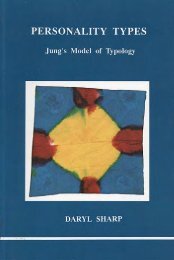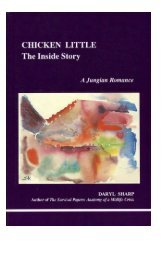Digesting Jung: Food for the Journey - Inner City Books
Digesting Jung: Food for the Journey - Inner City Books
Digesting Jung: Food for the Journey - Inner City Books
Create successful ePaper yourself
Turn your PDF publications into a flip-book with our unique Google optimized e-Paper software.
A Psychological Compass 17<br />
modes of adaptation. In <strong>the</strong> <strong>for</strong>mer, <strong>the</strong> movement of energy is toward<br />
<strong>the</strong> inner world. In <strong>the</strong> latter, interest is directed toward <strong>the</strong><br />
outer world. In one case <strong>the</strong> subject (inner reality) and in <strong>the</strong> o<strong>the</strong>r<br />
<strong>the</strong> object (outer reality) is of primary importance. Whe<strong>the</strong>r one is<br />
predominately introverted or extraverted—as opposed to what one<br />
is doing at any particular time—depends on <strong>the</strong> direction one’s energy<br />
naturally, and usually, flows. 11<br />
Each of <strong>the</strong> four functions has its special area of expertise.<br />
Thinking refers to <strong>the</strong> process of cognitive thought; sensation is<br />
perception by means of <strong>the</strong> physical sense organs; feeling is <strong>the</strong><br />
function of subjective judgment or valuation; and intuition refers to<br />
perception via <strong>the</strong> unconscious.<br />
Briefly, <strong>the</strong> sensation function establishes that something exists,<br />
thinking tells us what it means, feeling tells us what it’s worth to us,<br />
and through intuition we have a sense of what can be done with it<br />
(<strong>the</strong> possibilities).<br />
No one function by itself (and nei<strong>the</strong>r attitude alone) is sufficient<br />
<strong>for</strong> ordering our experience of ourselves or <strong>the</strong> world around us:<br />
For complete orientation all four functions should contribute<br />
equally: thinking should facilitate cognition and judgment, feeling<br />
should tell us how and to what extent a thing is important or unimportant<br />
<strong>for</strong> us, sensation should convey concrete reality to us<br />
through seeing, hearing, tasting, etc., and intuition should enable us<br />
to divine <strong>the</strong> hidden possibilities in <strong>the</strong> background, since <strong>the</strong>se too<br />
belong to <strong>the</strong> complete picture of a given situation. 12<br />
In everyday usage, <strong>the</strong> feeling function is often confused with an<br />
emotional reaction. Emotion, more properly called affect, is invariably<br />
<strong>the</strong> result of an activated complex, which is accompanied<br />
11 Note that introversion is quite different from introspection, which refers to selfexamination.<br />
Although introverts may have more time or inclination <strong>for</strong> introspection<br />
than do extraverts, introverts have no monopoly on psychological awareness.<br />
12 Ibid., par. 900. <strong>Jung</strong> acknowledged that <strong>the</strong> four orienting functions do not contain<br />
everything in <strong>the</strong> conscious psyche. Will power and memory, <strong>for</strong> instance, are<br />
not included in his model, because although <strong>the</strong>y may be affected by <strong>the</strong> way one<br />
functions typologically, <strong>the</strong>y are not in <strong>the</strong>mselves typological determinants.










